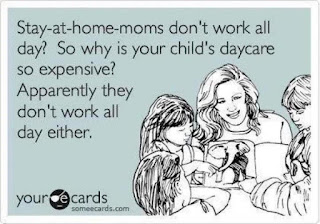 No, I have never worked professionally in Real Estate. However, in the last 6 years I have sold a house, plus been house-hunting for my family 6 different times--7 if you count hunting for a new apartment with my eldest son! With various real estate agents I have toured more than 2 dozen houses in 2 different States. And I've seen some things that have proven to me that while some of these things may seem like common sense, they evidently are NOT so common!! I've also had the privilege of working with one Realtor who is amazing, and yes some of the following comes from her (thank you, Tracy Hoyt in Valrico, Florida!!). :) So, if you are getting ready to sell your house, and actually reading my obscure little blog, here is some free amateur advice of basic and inexpensive prep work (because we well know that not everyone can afford to do major upgrades and updates). Little things really can make a big difference, because when you are selling a home, first impressions matter.
No, I have never worked professionally in Real Estate. However, in the last 6 years I have sold a house, plus been house-hunting for my family 6 different times--7 if you count hunting for a new apartment with my eldest son! With various real estate agents I have toured more than 2 dozen houses in 2 different States. And I've seen some things that have proven to me that while some of these things may seem like common sense, they evidently are NOT so common!! I've also had the privilege of working with one Realtor who is amazing, and yes some of the following comes from her (thank you, Tracy Hoyt in Valrico, Florida!!). :) So, if you are getting ready to sell your house, and actually reading my obscure little blog, here is some free amateur advice of basic and inexpensive prep work (because we well know that not everyone can afford to do major upgrades and updates). Little things really can make a big difference, because when you are selling a home, first impressions matter.1. Remove as much clutter and personal items as possible. You are getting ready to move anyway, right? So, pack that stuff away. Two or three family photos here and there makes the house look like a home, and not a model or a hotel, so don't remove every single one. But having strange faces staring at you from every wall is a little disconcerting when you are walking through a potential new home, and those walls completely covered with photos have GOT to go. Potential buyers want to see the actual wall, and I know whenever I saw walls overwhelmed with stuff I wondered just what problems all those frames may be hiding. Cost: $0
 2. Don't feel like you have to repaint the whole house, unless you have color or pattern choices so unusual they may make the average buyer balk (as pictured, though this particular photo is from the web, not from a house I saw personally). I still remember the house we toured with one bedroom painted entirely black. Yes, that was a bit much--it was hard to see the room, even with the lights on. Most other colors, as long as they look nice, may be OK. What is more important is CLEAN walls that do not have any obvious damage. So do patch the holes for any excess decor you remove (in #1), and take the time to do some touch-up here and there to make sure your walls look fresh and clean. I've seen walls in homes for sale with obvious dirt and cobwebs. Yuck. If you have the time and money, consider doing some touch-up of the baseboards and ceiling edges also--those paint splatters are more noticeable than you think to some buyers! Cost: $0 if you have extra leftover paint on hand, minimal if you need to purchase small cans for touch-up.
2. Don't feel like you have to repaint the whole house, unless you have color or pattern choices so unusual they may make the average buyer balk (as pictured, though this particular photo is from the web, not from a house I saw personally). I still remember the house we toured with one bedroom painted entirely black. Yes, that was a bit much--it was hard to see the room, even with the lights on. Most other colors, as long as they look nice, may be OK. What is more important is CLEAN walls that do not have any obvious damage. So do patch the holes for any excess decor you remove (in #1), and take the time to do some touch-up here and there to make sure your walls look fresh and clean. I've seen walls in homes for sale with obvious dirt and cobwebs. Yuck. If you have the time and money, consider doing some touch-up of the baseboards and ceiling edges also--those paint splatters are more noticeable than you think to some buyers! Cost: $0 if you have extra leftover paint on hand, minimal if you need to purchase small cans for touch-up. 3. Speaking of cleaning, don't forget the yard and any smells. Have a friend who doesn't visit often walk in and sniff, because honestly you might not even notice if you live there all the time (especially pet odors). This is especially important if you have to vacate the house before it sells--I've seen vacant houses with overgrown yards that reeked of pet odor or some other smell (made worse, no doubt, by sitting vacant with the a/c off and the heat deepening the odor). I have had one or two houses that I walked out of without even seeing the whole thing, because it smelled THAT bad to me. Yes, this one may cost you something if you have to leave the house empty and are unable to go yourself each week to clean it and mow the yard, but you may be able to save some $$ by hiring a reliable local teen or college student. Cost: Will vary
3. Speaking of cleaning, don't forget the yard and any smells. Have a friend who doesn't visit often walk in and sniff, because honestly you might not even notice if you live there all the time (especially pet odors). This is especially important if you have to vacate the house before it sells--I've seen vacant houses with overgrown yards that reeked of pet odor or some other smell (made worse, no doubt, by sitting vacant with the a/c off and the heat deepening the odor). I have had one or two houses that I walked out of without even seeing the whole thing, because it smelled THAT bad to me. Yes, this one may cost you something if you have to leave the house empty and are unable to go yourself each week to clean it and mow the yard, but you may be able to save some $$ by hiring a reliable local teen or college student. Cost: Will vary4. While you have that friend over to check the smell, ask him or her to walk around your house and look for other out-of-the-ordinary or too-personal things that may put off a buyer. I looked at one house that had a child's name painted large and bold on his wall. Many house hunters want to be able to move in immediately, painting later, and something like that could easily put them off. Different colors are fine. Large murals or personal things? Probably not. The most unusual personal item I saw when house-hunting was a large and clearly labeled grave in the back yard, most likely for a pet (because the marker held a single name). Now I have buried a cat in a yard before, and I understand the desire to want to remember that beloved pet and even mark the grave in some way. But mark it with a bush, a tree, or even a plain but decorative rock. Please don't ask a stranger to buy your house with a memorial to your pet still there. Cost: Will vary, according to what you need removed and what you may need to do to fix it.
5. Do any routine maintenance you have been putting off. HVAC (heating and air conditioning) systems in particular should be routinely serviced every year. Outdoor wooden features (deck, swing, etc.) should be resealed each year, especially in damp climates. Many people don't seem to know this, or fail to keep up with it during years of renting the home. But those years of neglect are almost guaranteed to cause damage that will show up on the home inspection for any potential buyer. Save yourself some frustration and cost in the final days (or worse, a lost sale!) by looking over these things and doing necessary repairs in advance. Check over plumbing and appliances remaining also. Defrost that freezer, and clean out that dryer vent, etc. Cost: Depends on whether you kept up with routine maintenance in the years you owned the home. If you have, then very little!
6. Check the electrical outlets and light switches. It's best if all of them in a single room match, at least, if not all of them throughout the house. This is especially true if you will be showing the house after it is vacant, because then those mis-matched covers are REALLY noticeable, and they tend to look haphazard and unfinished. If you must, replace them all with white--those are often priced at about 50c each, so cost will be minimal. And don't forget to make all the screw heads point the same direction. (Really! This is something I would never even notice, but my husband did, and he worries that all the electrical work must be "sloppy" if this simple thing isn't done.) Cost: minimal
7. Clean the windows and sills, and make sure every one has some sort of dressing for showings. Simple white rods are very inexpensive; there is no need to spend a lot. If you have basic sewing skills, you can make curtains from old clothing, sheets, or towels, or you can purchase used ones quite cheaply at thrift stores and yard sales. Yes, I do understand this is partly a style preference, and some people prefer naked windows. However, I know I'm not the only one who feels that it just makes it look more finished, and if you ever have to leave the house vacant this has the advantage of making the house look occupied from the street (discouraging vandals or squatters). Cost: minimal
 8. Check the kitchen cabinets (and any other cabinets) and doors for loose hinges, drawers that don't close quite right, etc. This is another thing which may be overlooked, but some buyers are more thorough than others, and having loose doors or knobs and wonky drawers makes a house seem worn out and not cared for at all. It especially looks bad if the drawer is hanging off. Cost: Little or nothing (possibly replacing a screw or something)
8. Check the kitchen cabinets (and any other cabinets) and doors for loose hinges, drawers that don't close quite right, etc. This is another thing which may be overlooked, but some buyers are more thorough than others, and having loose doors or knobs and wonky drawers makes a house seem worn out and not cared for at all. It especially looks bad if the drawer is hanging off. Cost: Little or nothing (possibly replacing a screw or something)9. Take the time and expense to spray the house for bugs, and clean out the light fixtures of dead bugs (and other dust). Nothing says dirty and not cared for like seeing live bugs crawing around, or turning on an overhead light with a shade filled with dead bugs. Ew. Cost: In this area it is anywhere from $50 to $150 for a one-time visit from a professional exterminator, and you could easily save money by doing this yourself.
10. If you can afford it, and haven't recently done so anyway, add some nice permanent item that makes the house look more like a home, that has been occupied by people who really care about it--something that will stay with the house, like a bonus. You could put a nice little bird feeder in the yard. You could add a storage cabinet in the garage, or some nice built-in shelving. You could add a nice little flower garden in a corner of the yard. You may not be able to afford to do a BIG thing like remodel a bathroom or put in a new patio, but you can still do a little thing that people will notice and appreciate, something that will make people think about themselves living in that house and enjoying watching the birds or smelling the flowers, etc. Be creative! You can't change the location or the footprint of the house, but you can make it look like an appealing and well-loved home! Temporary "staging" things are good too, of course, but permanent things are more likely to be the things they talk about. I remember talking about the house with the patio tent, the house with the bird feeder, the house with the built-in cabinets in the garage, etc. Those are the little niceties that make it memorable. Cost: will vary according to what you decide to do.














